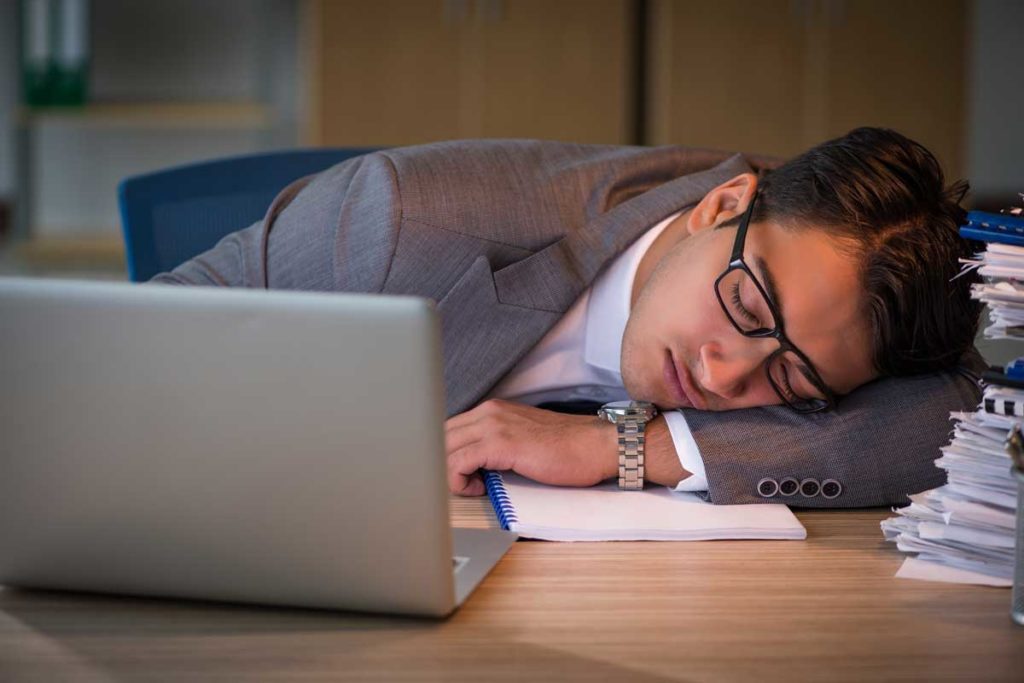Sleep Deprivation and Addiction: Transitioning Into a Relaxed State
- / blog

If you have struggled with a substance use disorder, it is likely that you have experienced sleep issues at some point, too. Substances like drugs and alcohol significantly impact your body, even when substances are absent from the system. It can be especially troubling in recovery.
You might still experience sleep deprivation because your past use is still hindering your body. Therefore, understanding the relationship between substance use and sleep deprivation is beneficial in improving the consistency and restfulness of your sleep. Let’s look at the connection between addiction and sleep deprivation and how you can improve your overall sleep.
Sleep Deprivation and Addiction
Managing your sleep takes understanding how substance use affects your body’s ability to rest. No matter which stage of substance use you’re in—whether you are actively using, in withdrawal, or recovery—your addiction could have more to do with your restlessness than you realize. Alcohol is a common perpetrator against sleep despite common beliefs. While some people associate drinking alcohol with unwinding, it prevents you from falling into deep REM sleep and attaining quality rest.
Additionally, alcohol can affect the number of times that you wake up during the night. Other stimulants such as amphetamines, cocaine, and methamphetamine certainly make it hard for your body to relax while under the influence. However, research shows that even if you have stopped using, there can be lingering effects. If you are in the withdrawal phase, you might experience insomnia that could last for weeks or months. It is essential to understand which stage of addiction or addiction recovery you are in and then find the best help to cultivate better sleep.
The Problems With Poor Sleep
Continuing to either use or neglect addressing your sleep deprivation can create more mental and physical health issues. A range of symptoms and issues might include:
- Sleep apnea
- Trouble falling asleep
- Trouble staying asleep
- Disturbances in sleep cycles
- Feeling tired throughout the day
Trying to manage these symptoms without professional help could cause you to continue to self-medicate or relapse. Sleep deprivation can cloud your judgment and create a slippery slope, especially if you have a substance use disorder. Recovery is an arduous journey, and it can feel nearly impossible to maintain if you are going without rest night after night.
How to Break the Cycle
While sleep deprivation and insomnia can leave you feeling hopeless over what to do, understand that there are options to help you. Whether you are actively using or in recovery, it is always best to seek professional help. Seeking assistance from a professional can include attending rehab to help you reduce and cut out substance use completely.
At Choice House, we help you find treatments that will appropriately monitor your health and provide 24/7 assistance while you endure the stages of detox and attain sobriety. Once you are sober, you can continue treatment and therapy that will help prepare you to implement better habits into your everyday life.
Create a Space for Sleeping
In addition to seeking professional help, you must understand how to utilize practices in your home that can continue to create a better sleep pattern. You can begin by looking at your environment, specifically your bedroom. Does this space nurture relaxation? Does it provide adequate darkness, cool temperature, and peace?
It is also important not to lie in bed after work or have stressful conversations with loved ones in your bedroom. The bedroom should be a space that provides comfort and security. You can add relaxation into your bedroom by adding plants, calming or neutral colors, and keeping the room tidy. Soon, your brain will recognize that this is a space to relax and sleep, and over time, the calm environment will become a natural remedy to getting quality rest.
Eliminate Screen Time Before Bed
It is essential to reduce your screen time before bed. Regular consumption of social media can have a similar effect to using substances because the blue light from your devices can create irregular hormonal changes in your brain, such as producing dopamine.
Getting off devices at least one hour before bed can increase your overall sleep quality and duration. Cutting back on social media can also help deepen the strong reward pathways connected to obsessively scrolling through various media platforms. You can try placing your phone out of reach a couple of hours before bed to help you avoid the temptation.
Keeping a Routine
Creating a consistent bedtime routine and sticking to it will help train your brain and body to recognize when to sleep. Start by getting ready for bed around the same time each night. You might meditate, read, or take a hot shower or bath during this time. If your mind continues to worry, write your stressors down. Writing out your thoughts can effectively acknowledge your concerns and “put them away” for the night. The idea is to get yourself into a relaxed state.
Sleep is essential for both mental and physical health. If you continue to use or think about using substances to help you sleep, then the time to get help is now. At Choice House, we offer a secure and comfortable space without outside distractions to help you develop the skills needed to manage sobriety, including getting good sleep. Our approach to treatment and therapy addresses men’s needs; therefore, we utilize practices and activities such as Outdoor Therapy that will speak to men and help men open up emotionally. We also remain a pillar of support throughout your recovery, so if you are ever in need of help, you can always rely on us to be there for you. With 24/7 admissions, there is never a wrong time to reach out. Remember, recovery begins with taking the first step to getting help. To find out more, reach out to us at Choice House today by calling (720) 577-4422.
